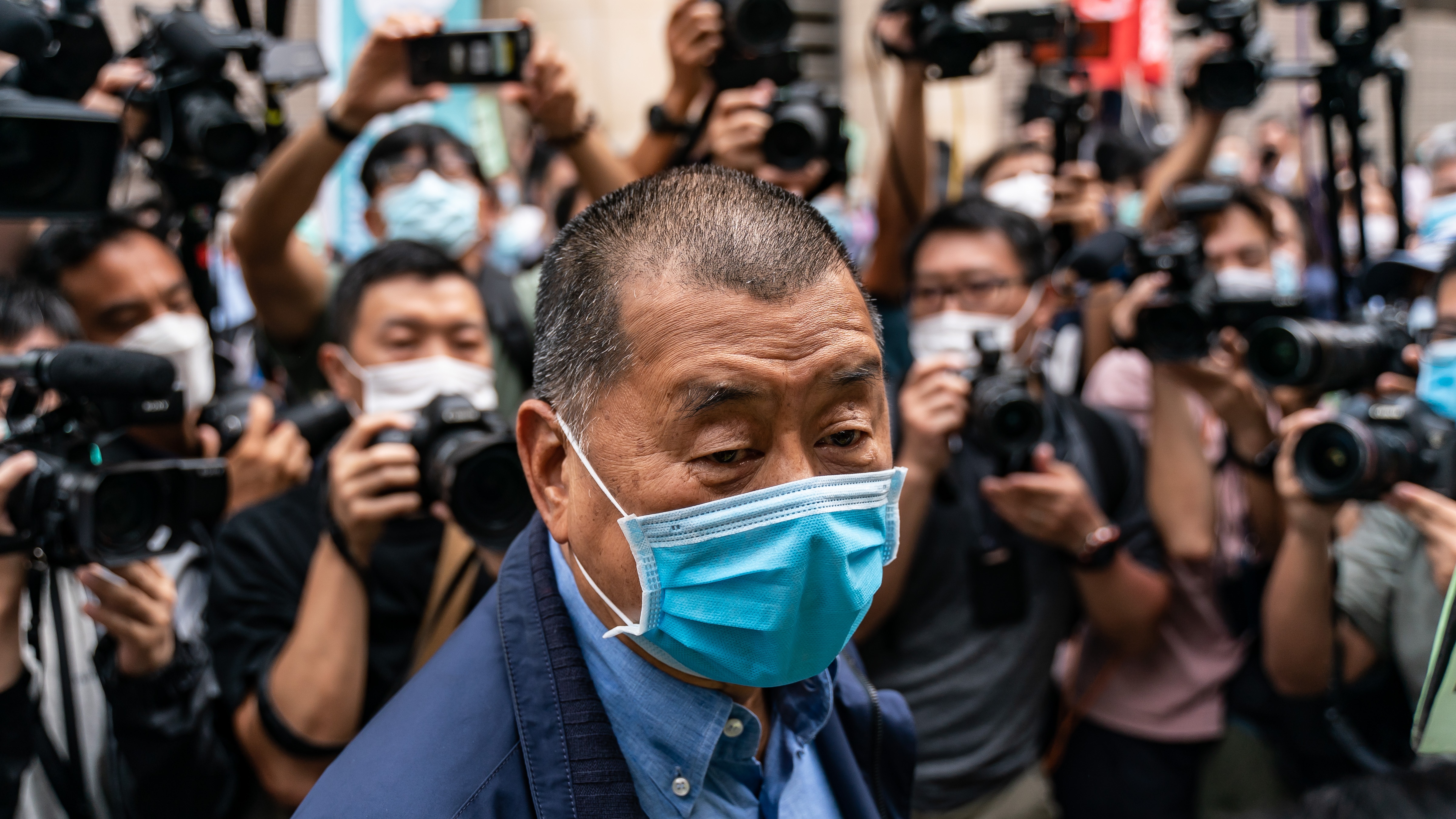The rise and fall of Hong Kong media mogul Jimmy Lai
Founder of Apple Daily newspaper convicted of incitement over Tiananmen massacre vigil

A free daily email with the biggest news stories of the day – and the best features from TheWeek.com
You are now subscribed
Your newsletter sign-up was successful
Hong Kong media mogul Jimmy Lai has been convicted, along with two other prominent pro-democracy activists, after taking part in a vigil to mark the Tiananmen massacre.
Lai, Gwyneth Ho and Chow Hang Tung were found guilty of inciting and taking part in an unlawful assembly after joining thousands of others at an event in June 2020 to commemorate the deadly 1989 crackdown at Beijing’s Tiananmen Square.
The founder of the now-defunct Apple Daily newspaper is one of the city state’s most prominent pro-democracy voices. But his advocacy for democratic causes has seen the billionaire clothing entrepreneur fall foul of China’s growing clampdown.
The Week
Escape your echo chamber. Get the facts behind the news, plus analysis from multiple perspectives.

Sign up for The Week's Free Newsletters
From our morning news briefing to a weekly Good News Newsletter, get the best of The Week delivered directly to your inbox.
From our morning news briefing to a weekly Good News Newsletter, get the best of The Week delivered directly to your inbox.
Rags to riches
Lai was born in the southern Chinese province of Guangzhou in the late 1940s, before entering Hong Kong as a stowaway on a boat and beginning work as a child labourer in a clothing factory earning around $8 (£6) a month.
He quickly rose to become the factory’s manager, using his bonuses to invest in the Hong Kong stock market. After achieving success as an amateur investor, he bought a bankrupt clothing factory, Comitex, where his growing business produced jumpers for massive US retailers including J.C. Penney and Montgomery Ward.
That first factory rapidly grew into Giordano, an Asia-wide retailer that would eventually employ almost 6,000 employees in 2,100 shops in 30 countries, according to the company’s website. In 1990, Lai founded Next Digital, the publisher of the now-closed Apple Daily, which became Hong Kong’s largest publicly listed media company.
Unlike others who “rose to the top in Hong Kong”, Lai emerged as “one of the fiercest critics of the Chinese state and a leading figure advocating democracy in the former British territory”, the BBC said.
A free daily email with the biggest news stories of the day – and the best features from TheWeek.com
But this meant “he has faced a string of cases in recent years and was eventually sentenced to a prison term” for “unauthorised assembly”.
The charge came following widespread pro-democracy protests in the city state and meant Lai became “the most prominent person charged under Hong Kong’s controversial new national security law, which can carry a life sentence”, the broadcaster added.
Speaking to the BBC last year, he described himself as “a born rebel”, adding: “I have a very rebellious character.” But that original charge, which led to him being jailed, has seen him go from what the broadcaster described as “a persistent thorn in China’s side”, to a convicted criminal.
‘Remembrance is resistance’
Lai’s transformation into a vocal critic of the Chinese Communist Party (CCP) has been widely attributed to the events of the 1989 Tiananmen Square massacre, in which then Premier Li Peng dispatched tanks and troops to disperse pro-democracy demonstrators.
“China has never given a full account of the 1989 crackdown,” CNN said, with officials placing the “death toll at about 300, most of them soldiers”. Rights groups and witnesses have long disputed this figure, claiming “thousands may have been killed”.
Following the deadly protest, Lai “started writing columns criticising the massacre that followed the demonstrations”, the BBC reported, as well as founding Next Digital, which “launched a string of popular pro-democracy titles that now include Next, a digital magazine, and the widely read Apple Daily newspaper”.
“China responded by threatening to shut his stores on the mainland,” the broadcaster added, leading him to sell his continental clothing empire in 2020.
Hong Kong has historically “held the world’s largest annual June 4 vigils” to mark the Tiananmen massacre, CNN reported, “as part of wide-ranging freedoms promised when it returned to Chinese rule in 1997”. However, the last two were cancelled by police under the auspices of coronavirus curbs.
Authorities have since “charged more than two dozen pro-democracy politicians and activists over a vigil last year”, The Guardian said, with only Lai, Ho and Chow contesting their charges in court.
“In practical terms, the convictions make minimal difference” as the trio are “among dozens of activists already behind bars facing separate prosecutions” under the national security law imposed last year.
“But their prosecution is the latest illustration of how much the gap has narrowed between Hong Kong and the mainland,” the paper added, “where authorities have long sought to scrub memories and official records of Tiananmen.”
During the trial, Chow, an ex-leader of the disbanded Hong Kong Alliance in Support of Patriotic Democratic Movements in China, a party to which Lai was a leading donor, argued the annual vigil was “their right, their freedom”, CNN said. Ho, meanwhile, argued that “remembrance is resistance”.
To his supporters, Lai remains “a man of courage who has taken on great risks to defend the freedoms of Hong Kong”, the BBC said.
But the new charges appear to signal the deliverance of a prediction he made following the passing of the national security laws in June, when he told the broadcaster that it would spell the “death knell” for the city state.